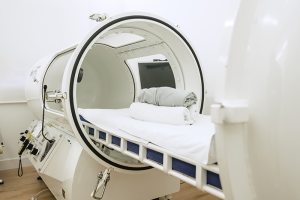Hospital honored for efforts to reduce radiological threats in health care
Hospital honored for efforts to reduce radiological threats
Emory University Hospital, Atlanta, received the Medical Innovation Award at the Washington, D.C., Nuclear Industry Summit for its efforts to reduce radiological threats in its facility.
Last month, the Nuclear Threat Initiative (NTI) recommended that nations and private sectors accelerate efforts to replace radiological materials in medicine with alternative technologies. Emory recently replaced a blood irradiator containing Cesium-137 with an alternative technology approved by the Food and Drug Administration. Cesium-137 is a radiological source that can be used to create a dirty bomb.
“All of us in Georgia can be proud that Emory is leading the way on reducing risks,” says NTI Co-chairman Sam Nunn. “I would call that a win all the way around, and I encourage more hospitals and research centers to look into whether they can do the same.”
NTI received the Innovation Leadership Award at the summit.
NFPA launches life safety specialist certification for health care facility professionals
The National Fire Protection Association (NFPA) announced the launch of a new certification program, Certified Life Safety Specialist, designed for health care facility managers and based on the 2012 edition of NFPA 101 Life Safety Code.
“This is the first offering among newly-designed specialist certifications built for facility managers, building engineers and others who are responsible for ensuring safety at their facilities,” says Lauren D’Angelo, NFPA segment director.
FDA issues draft guidance on hospital and health system compounding
The Food and Drug Administration (FDA) issued draft guidance explaining how it intends to apply section 503A of the Federal Food, Drug and Cosmetic Act to drugs compounded in state-licensed hospital or health system pharmacies for use within the hospital or health system. Some of these compounders have registered with the FDA as outsourcing facilities under section 503B of the Act, which was added by the Drug Quality and Security Act of 2013, and others are state-licensed pharmacies subject to section 503A. In addition, the FDA issued draft guidance on the meaning of the term “facility” under section 503B.
Mapping project shows environmental conditions in which Zika thrives
Scientists led by the University of Oxford and the Institute for Health Metrics and Evaluation in Seattle, have produced a fine-scale global map that shows environments suited to Zika virus transmission. The researchers focused on six variables, including temperature and rainfall that show that tropical and subtropical regions, such as those found in the southeastern states, have highly suitable environmental conditions for Zika transmission and are at the greatest risk.
DHS issues alert on ransomware
In response to recent ransomware attacks, the Department of Homeland Security’s Computer Emergency Readiness Team issued an alert that provides information on the main characteristics of ransomware, its prevalence, variants and how users can prevent and mitigate the threat.
CMS issues inpatient prospective payment system proposed rule for 2017
The Centers for Medicare & Medicaid Services proposed an inpatient prospective payment system proposed rule for fiscal 2017 that removes its controversial 0.2 percent inpatient payment cut on hospitals. The proposed rule would increase hospital payment rates by 0.85 percent in fiscal 2017 compared with fiscal 2016, after accounting for inflation and other adjustments required by law.
The American Hospital Association (AHA) called the decision “an important outcome” for hospitals.
“The rule includes a very important outcome because it reverses the inappropriate and unfair 0.2 percent payment reduction for inpatient services that was implemented as part of the original ‘two-midnight’ policy,” says AHA President and CEO Rick Pollack.




